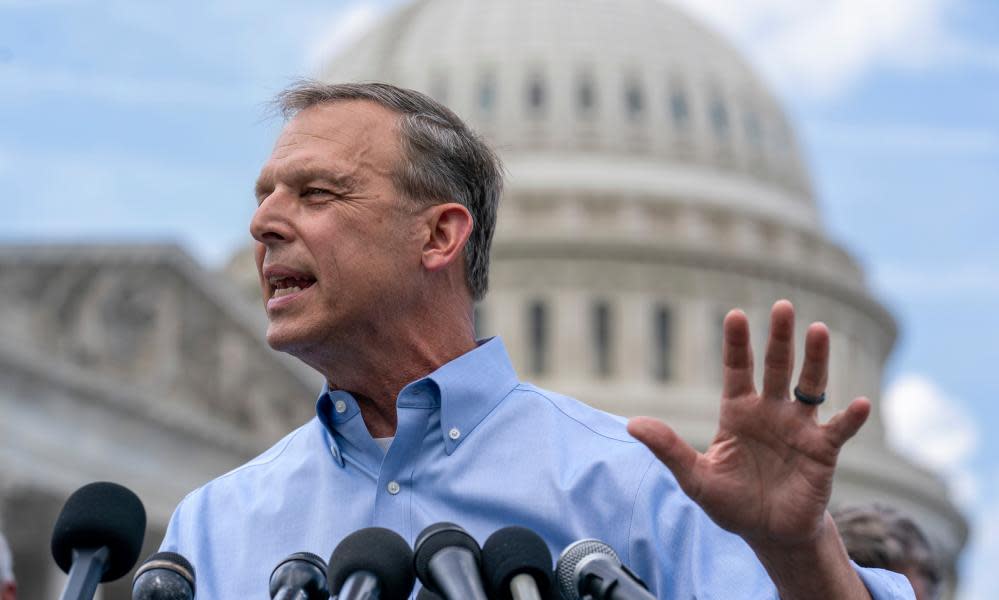Appeals court shields Trump ally Scott Perry’s phone in 2020 election inquiry

- Oops!Something went wrong.Please try again later.
- Oops!Something went wrong.Please try again later.
- Oops!Something went wrong.Please try again later.
A federal appeals court has ruled that top House Republican Scott Perry’s text messages about efforts to overturn the results of the 2020 election were constitutionally protected and off-limits to prosecutors, according to the opinion in the case that was newly unsealed on Wednesday.
Related: Republican congresswomen kicked out of musical for ‘causing disturbance’
The three-judge panel at the US court of appeals for the DC circuit found that Perry’s communications with congressmen and staff were protected under the so-called speech or debate clause, which shields members of Congress from legal proceedings connected to their official duties.
“These are quintessential legislative acts entitled to the privilege, and we vacate the district court’s judgment with respect to those communications and remand,” the appeals court ruled.
It also concluded the lower court was wrong to decide that Perry’s communications only qualified for the speech or debate clause protection if the fact-finding had been authorized by an official body, like a congressional committee, saying some “informal” fact-finding would be privileged.
The opinion – written by the Trump-nominated circuit judge Neomi Rao and joined by Greg Katsas, also nominated by Trump, and Karen Henderson, nominated by George HW Bush – marks a setback for the special counsel Jack Smith investigating efforts in 2020 to stop the peaceful transfer of power.
Still, the appeals court determined that some information gathered by Perry during his informal fact-finding might not be protected. For messages to qualify for the privilege, the appeals court ruled, they must be “integral” or “essential” to the legislative work in question.
It also rejected Perry’s categorical position that all of his messages, including to people not working in the executive or legislative branches, were privileged.
“We disagree with the district court’s holding that informal fact-finding is never a legislative act. But we also reject Representative Perry’s proposition that informal fact-finding is always a legislative act,” the appeals court found.
The ruling instructed the then chief US district judge Beryl Howell to reconsider her initial decision allowing prosecutors to access some of Perry’s phone, and apply their reasoning on a communication-by-communication basis for his messages with executive branch and non-congressional officials.
The case now goes back to federal district court in Washington, unless prosecutors ask for an en banc rehearing of the matter before the full DC circuit. A spokesperson for the special counsel’s office declined to comment on whether prosecutors would take that step.
For about a year, prosecutors have sought to trawl through 2,200 messages and documents on Perry’s phone related to his involvement in Trump’s efforts to reverse his 2020 election defeat and to stop the January 6 congressional certification of the 2020 election results.
The FBI seized Perry’s phone last August pursuant to a court-authorized warrant, even before Smith was appointed special counsel, but sought a second warrant to search through his texts and emails with members of Congress, executive branch officials and other third parties.
The interest in Perry, the chairman of the powerful and ultra-conservative House Freedom Caucus and one of Trump’s most ardent supporters on Capitol Hill, came because he introduced Trump to the former justice department official Jeff Clark in 2020, according to people familiar with the matter.
Clark subsequently became a central player in Trump’s efforts to decertify the election results in battleground states that he lost and infamously drafted a false memo saying the justice department was investigating election fraud in Georgia when it was not.
That false memo, among other things, led to prosecutors in Fulton county, Georgia, charging Clark alongside Trump and others on racketeering charges alleging that he violated state law in trying to overturn the election results. Clark has pleaded not guilty in that case.
Perry was also involved in meetings with Trump at the White House in the weeks before the Capitol attack, including a strategy session with other Republican members of Congress on 21 December 2020, where they strategized ways to stop the certification from taking place.

